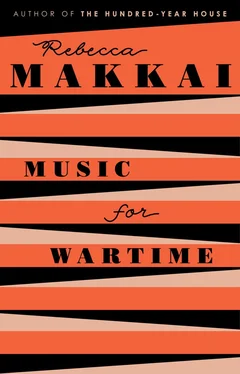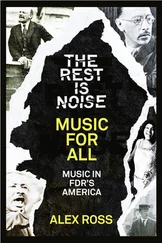I knew I should have introduced Peter to the other actors, told him where to be, but leaving him alone was my small way of shaking him by the shoulders, of telling him to grow up. When I saw him again, he was talking to one of the actresses he knew from Chicago Shakespeare, a woman who’d just returned from off-Broadway and chopped her hair short. She was laughing at something he’d said, and he was teetering back and forth as if he might at any second lose a lifelong battle with gravity. He was laughing, too, but the way his skin stretched across his jaws, he looked deathly.
I took the microphone and welcomed everyone. My voice could never command a room; people milled and talked and jostled for position. I introduced the five actors, and it wasn’t until they came and stood beside me that I noticed Peter still had his puffy green coat on, his hands shoved down in its pockets. I wondered if he was punishing me for leaving him alone, or if he was so thin under there that he didn’t want to frighten people. In high school, he would take his shirt off at every opportunity, claiming it was hot out at sixty degrees. I’d assumed back then that his dark skin was from Italian genes, but now I saw it must have been the sun.
The two other men were dressed in sleek sweaters, and the two women wore silk blouses and pants. Audition outfits, like Peter used to have dozens of. He looked now as if we’d grabbed him off the street.
We started with the first painting, Caillebotte’s Paris Street; Rainy Day , and the short-haired actress read a brief Stuart Dybek story called “Rainy Day Chicago.” When she finished, the crowd moved across the gallery to a tiny Picasso, where one of the men read a poem called “Triangle Woman.” We’d pulled a miracle, getting the Art Institute to move so many of its own crowd-pleasers into one exhibit. Even so, there were certain works they wouldn’t let us use. We’d asked the writers to e-mail us their wish lists, and Nighthawks topped almost every one. It must have been something about the loneliness, the coffee, the silence — everyone wanted to lay private claim to that one desolate corner of the universe. In the end, no one got it because it was on loan in New York. How could this one object embody loneliness, I wondered, when people crowded shoulder-to-shoulder around it, shared it, traded it, paraded it? If Hopper’s little coffee counter was lonely, it was in the way a prostitute was lonely. Or an actor.
I had a hard time paying attention, and I stood there thinking how flat the readers all were, how little grace they showed compared to Peter in his prime. He played Edgar in Lear one summer up in Evanston, in the park by the beach. He was beautiful in a red shirt, and his voice made every line sound like something you’d been on the verge of remembering, if you’d only had time.
Peter’s first reading was for my least favorite story, as well as my least favorite painting in the entire museum. A very young, way-too-hip fiction writer from Bucktown named Sam Demarr had e-mailed us that the only painting he felt like writing on was “the one with the giant gum.” I’d actually loved it as a child — that enormous pack of gum floating over the city skyline. Now I hated how the gum hovered there, out of proportion. It had nothing to do with the city below it, no shared color palette, the garish green wrapper rendering the brown skyline drab and uniform. On one of our first dates, Carlos and I had stood there joking that it was based on a true story, the Giant Gum Crash of ’72. Since then, I’d always thought of the gum as about to land, to flatten the unsuspecting workers below, so I’d found it particularly funny that the story Sam Demarr had submitted was called “The Gum Flew Away.” Demarr himself was standing at the side of the room in dirty khakis, smirking into his wineglass.
Peter pulled a tube of papers from his coat pocket and unrolled it so he could read the top one. The other actors held theirs in the black folders we’d sent them in. “First, all the gum flew off,” he read, “leaving Chicago in its spearmint dust. Then the department stores floated away.” Aside from the fact that his papers were visibly shaking, Peter sounded like himself, strong-voiced and in full command of the English language. This story suited his flat, ironic delivery. I’d chosen it for him specifically because it was monochromatic and free of dialogue. “The hot dog stands were next,” I heard him say. For all my daydreaming about finding myself stranded onstage, this was the closest I’d come to feeling as if it were my own energy propelling an actor, as if when I stopped focusing, the whole thing would fall apart. Peter was gesturing around now, with the still-shaking papers, backing toward the wall and away from the old ladies in the front row. Even his legs were bouncing, and it finally occurred to me that maybe it was drugs making his limbs and voice and eyes jump around like that. It didn’t seem like something he’d do, but who was I, anymore, to say what Peter would do?
And then, as he read the line about the mayor launching himself off the Hancock tower, Peter actually put the back of his hand against the painting and swept it up the canvas. The gasp from the crowd was so loud and so high that I couldn’t tell where it stopped and the alarm started. A security guard I’d barely noticed trotted from the room, and another stepped forward, speaking into a radio. Peter froze, and I could feel his stomach flip. I could feel the sweat sticking the papers to his hand. The alarm turned off, and people started talking quietly.
“And this is why we didn’t broadcast live,” Lauren whispered beside me. She was glaring like I’d done it myself. The Institute coordinators talked in a cluster while two more guards and a woman in a suit rushed in, asking Peter to step aside so they could inspect the painting for damage.
The crowd just looked embarrassed, touching their faces and chatting a bit but waiting politely for the reading to resume. Sam Demarr seemed to find the whole thing hilarious. Peter had stepped aside, but he was still up there in front of everyone, the only movement coming from his eyes, which jumped around liquidly, looking for their chance to leap free from his face once and for all. One of the guards talked with him in what should have been a whisper, but everyone could hear. He asked for his name, his driver’s license, copied everything down on a big clipboard.
And I thought, maybe that’s what I would have done, if I’d leapfrogged up there into Peter’s body, if I needed to get away before anyone realized I was a fraud: I’d hit the painting and make the show stop. But I didn’t think he’d done it on purpose. Or at least not consciously.
It was a good five minutes before the woman in the suit stepped away from the painting and signaled that we could continue. She stayed there, though, in the corner of the room, frowning. I assumed she’d have a long night of paperwork now. I felt bad for her.
I took the mike again and said, with a big fund-raising grin, “Now you’ve seen what fine security your contributions support!” Lauren was at the front of the crowd, shaking her head to show how disappointed she was, as if I hadn’t gotten the message yet. “We’re going to try that one again.” I waited for a meek laugh from the audience and then turned to the actors. Peter looked at me with those blank, jumpy eyes like he didn’t even recognize me, like I was just another blurred member of his audience, watching and breathing and waiting for him to fail. I’m still not sure what I felt, standing there. Maybe I felt my heart break, or maybe I felt Peter’s heart break. When you’ve known someone that long, when you formed yourself around his personality back when you were just a fourteen-year-old lump of clay, isn’t it really the same thing? Aren’t his heart and your own somehow conjoined? Perhaps that’s what I could never explain to Carlos: Ours was a kind of first love that wasn’t aimed at each other, but somehow out at the world. We We were forever side by side on the chapel bench, watching the show.
Читать дальше












